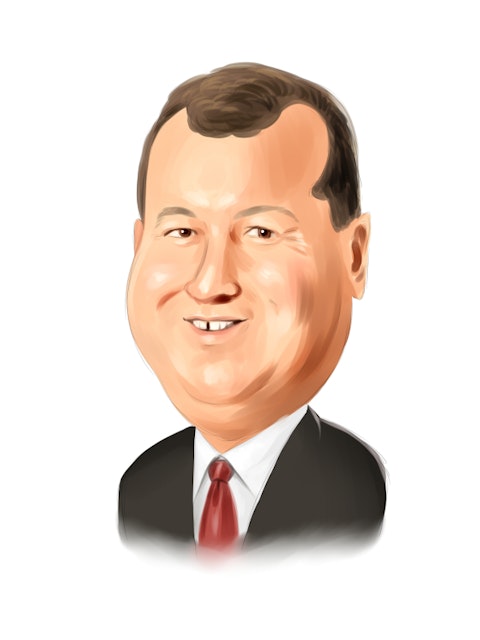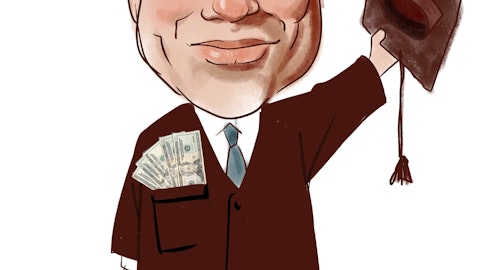Earlier in January we spoke with Tom Gayner of Markel. Read on for his thoughts on the investment process, what books investors should read, some of his favorite asset managers and how he works their stock picks into his analysis, and more:
Insider Monkey: Do you have any favorite stocks or favorite industries at this time, and what do you think the market is missing there?

The last couple of years what we have been buying are the big multinational global brand name kind of companies. Ones that pay nice dividends, have good ROEs, and buy back stock and all the kinds of things you like to see. That has worked pretty well and those things have moved up pretty nicely and as such, in general, they’re not as cheap as what they were a year, or two, or three ago so I’m not pounding the table on that. I’m kind of waiting for inspiration to strike on where I might go next.
Insider Monkey: So, a year, or two, or three years ago what were you pounding the tables at, what were you excited about?
Tom Gayner: Wal-Mart, and Nestle, and Diageo, and Anheuser-Busch, Berkshire, things like that in terms of that category of global multinationals.
Insider Monkey: Okay. Let’s take a step back and go through your investment process from where the initial idea comes from to where the buy decision is made.
Tom Gayner: We look for four things in general broad brush terms. The first is we want businesses that are profitable with good returns on capital and don’t need to use a lot of leverage to get to good results. What that does is preclude things like venture capital which is a fine and legitimate discipline, but that’s just not our discipline, we don’t know how to do that. So we want to see businesses are profitable and that will have a few years history of returns on capital.
One of the things I really like about that, is when you see a profitable business that is durably profitable year after year, that to me is a real social stamp of approval that they are doing something that the world wants and needs, and they’re good enough at it that they can do it and leave a margin of profit left over for themselves which is a very good marker of durability.
Because if you have a business which is not profitable and not doing too well, to me that means they’re doing something that the world doesn’t care about or doesn’t need, or they’re not good enough at it relative to some of the competitors such that they can have appropriate profit margins.
The company that will do best over the long run is a company that is making their customers very happy and they are satisfying their needs. Profits are a very good barometer to tell you whether that is indeed happening or not.
Insider Monkey: So, in that first step are there any investment screens or value statistics? Just to give an example, a price to earnings multiple or a high net margin?
Tom Gayner: Well the price to earnings multiple is a valuation metric of the stock itself. That is not in and of itself anything for the profitability of the business, so that is not a metric we would look at in regards to that first point. I’ll get into that later but that is not from step one.
The net profit margins, return on capital, return on assets, return on equity, things of that nature, those are the sorts of things that would matter in that regard. Clearly, we would not look at anything unless it was in double digits in terms of return on equity and we don’t want to see a lot of leverage used to get there. So that is the first screen.
The second screen and the second thing we talk about and think about and we care a lot about is more the investment and management team with equal measures of talent and integrity. Because one without the other is worthless- people who have integrity but maybe are short talent may be very nice people and you may like them, you may be comfortable with them and enjoy their company and all that but in context of the business they can’t really get the job done. So that doesn’t do you any good.
In the alternative if you attract people who have talent but perhaps an integrity problem they may do well but we as their outside partners won’t so we try to discern that the management teams we’re investing with have equal measures of both.
The third thing we think about is the reinvestment dynamics of the business and that’s to say if they make money what do they do with it? If you have very good returns on capital and reinvest that at the same or better returns year after year after year, you become a compounding machine. The second best business in the world is one that makes very good returns on capital, can’t really reinvest that easily or well, but the management knows it and they’re intellectually honest about it. So either they’re good at acquisition, or they pay out dividends, or they repurchase shares or something like that to indicate that they are good managers and your capital is worth more than the business itself.
The worst business in the world is one that doesn’t earn very good returns on capital. So we stay as far away as possible. That’s what we think about our perspective there.
The fourth and final general area that we think about is valuation and that is where the P/E ratio and things of that nature come into play. If you have those first three attributes in place, what do you have to pay to get it? You can have great businesses that intrinsically do very well, but if you pay way too much for it, you as an investor will earn subpar returns. The business can’t live up to its valuation metrics.
Insider Monkey: Is there any way that that process has changed since you started at Markel, either because you learned a way to improve or because the technology has changed?
Tom Gayner: No, that basic framework has been consistent with the way we’ve been doing things for 22 years. I would like to think we’re better at it than what we were 22 years ago by virtue of having practiced it for years and learned a lot of lessons but the basic intellectual framework hasn’t changed.
Insider Monkey: How does Markel track its performance and talk about its track record?
Tom Gayner: Well, we just count up how we did each quarter and each year and cumulatively keep track of it. I’ve been here 22 years and we’ve done very well and I make that statement on the basis of, we’ve outperformed the S&P 500 over 22 years by a couple hundred basis points, and that seems pretty good to me. That’s the first thing and largest thing that gives us some sense of how we’ve done.
Insider Monkey: Are there some books about investing that you’d recommend to a general or retail investing audience, either because they were useful when you were starting out or because they offer an interesting point of view on the markets?
Tom Gayner: Well, this is not an original answer but that’s okay because it still works. I basically start with Graham & Dodd, and the first or second edition not the later editions, that’s very important, The Intelligent Investor, just like Buffett says, those are fundamental books and it’s very important to have those under your fingertips. I think it’s important to have some reasonable understanding of accounting. You have to know that accounting is the language of business, you need to know what those numbers mean when you’re looking at financial statements. You don’t need to be the chief accountant of the SEC but you need to know something about accounting. Once you know that, then the investment books are further explanations or anecdotes or stories or refinements of those basic things. I also like a lot of literature because I think the way my mind works with the reasoning and analogies, heuristics, things of that nature, is very helpful. For instance, sometimes off the wall I tell people, “If you understand accounting and you really have Graham and Dodd down cold the next thing you should read is every word that Mark Twain ever wrote.” Mark Twain was rich and poor- or as I should say, rich and broke, rich and broke, rich and broke several times in his life and there is an undertone that he’s writing about money and the way people act when they have money and the way people act when they don’t and in terms of being helpful in decision making and recognizing human foibles and weaknesses and having a good laugh while you’re learning. Mark Twain is at the top of the list.
Insider Monkey: Which stock picker, other than Warren Buffett, would you like to have managing your money or part of your money for the next 10 years?
Tom Gayner: I have some great friends in this business who are very thoughtful money managers and do a very good job in the way they think about this business. I think Chris Davis is a great guy. I think Chuck Akre is a great guy. I think Preston Athey is a great guy. There are 10 others or 20 others that I would like and trust, and expect will do very well over long periods of time.
Insider Monkey: We have your 13F filing from the end of September (see what stocks Markel reported owning) for Markel and we see that you like Berkshire (find Warren Buffett’s favorite stocks). You like Fairfax Financial, where you have Prem Watsa, a very similar set up (check out Prem Watsa’s stock picks). Do you follow what those investors are doing?
Tom Gayner: I think it is very important to pay attention to what really smart people are doing and incorporate that into your thinking and sort of ask yourself, “Why are they doing that and why are they not doing something else?” And, “How did they come to those decisions?” Or, “What did they see that I don’t see?” It is a very helpful and healthy thing to indeed follow the actions of smart people and think about what they’re doing and why.
Insider Monkey: How do you do that? How do you approach that when you get some sort of information?
Tom Gayner: Well, you just read annual reports, you read four or five newspapers a day, you read a lot of trade magazines and sort of have a general awareness and keep reasonably well informed about that sort of thing.
Insider Monkey: Do you go back to the beginning of your process you described earlier, does it kind of jump to the top of the list so to speak?
Tom Gayner: Exactly. I mean, it’s very important to not blindly follow anybody.
Insider Monkey: Right, we agree.
Tom Gayner: You don’t know why they’re doing things or you don’t know what their circumstances were or what caused them to make a particular decision but, that being said, it behooves you as a professional when you see talented people or smart people that have demonstrated records of excellence, you ought to at least think about why they’re doing something and see whether that fits or makes sense for something you do as well or not.
Insider Monkey: Is there anything you can tell us about what you might like or maybe might have liked about CarMax Inc (NYSE:KMX)? We have that as being one of Markel’s largest positions in September.
Tom Gayner: We have had it for quite a while. We were very fortunate to have bought that when it was a much smaller company than what it is right now and actually at an extraordinary low price and it stumbled a little bit coming out of the gate when they started out. I think it’s a very robust business and one that- like on point number 3 in what I was telling you about in terms of the reinvestment ability. The ability to take that approach in how we do business over, and over, and over again and expand their footprint was dramatic. So, it passed that four point test that I talked about.
Insider Monkey: You also were buying some Walgreen Company (NYSE:WAG) in the third quarter of the year. Did you do anything different there because so much of the returns, at least from our perspective, depend on the Express Scripts situation?
Tom Gayner: I don’t agree with that particular analysis. That would be helpful and how that all plays out will influence the returns but I don’t think it will dominate the returns. I mean, there’s a case where we review those four points, they’re demonstrably successful with good returns on capital, not just for the last year or two for the last 30 or 40 years. The management team is honest and talented. The capital allocation decisions in terms of the increased dividends, share repurchases and the big fundamental business decisions that they’re making, in terms of how they have dealt with the Express Scripts issue, the choice to do the alliances and business deals, all those sorts of things. I think they are really smart and good people and the market is misunderstanding it.
Walgreens was in fact exactly the kind of opportunity I spoke of when I say I sit around and say, “I don’t have any ideas, I don’t have any ideas,” and sometimes something drops out of the sky and Walgreens was one of them. The market marked down that price, in consequence I started- I had a general awareness of the company but ended up doing a lot more work and thinking about it much more deeply and came to the conclusion that it is going to be a really good idea in good circumstances over the fullness of time. So, we bought the stock.
Insider Monkey: We’ve been talking a lot about buying in these last few questions, and you are a longer term investor, but how do you come to a decision that it’s a good time to sell?
Tom Gayner: Two things; one, if I find out that I was wrong about my thesis as to why I thought it was a good idea. The best thing to do is to admit you’re wrong and sell it and move on. That happens from time to time. The other thing is we do have a finite amount of capital and we don’t try to turn things over a lot, as you correctly pointed out, but as a spectacular idea comes along and we have only limited funds to buy it, well then it should also be compared against everything we already own to see whether it’s appropriate to shift capital from one use to another.





